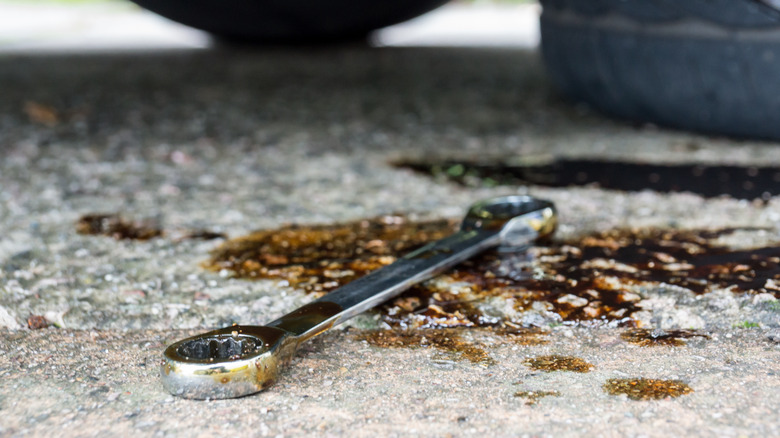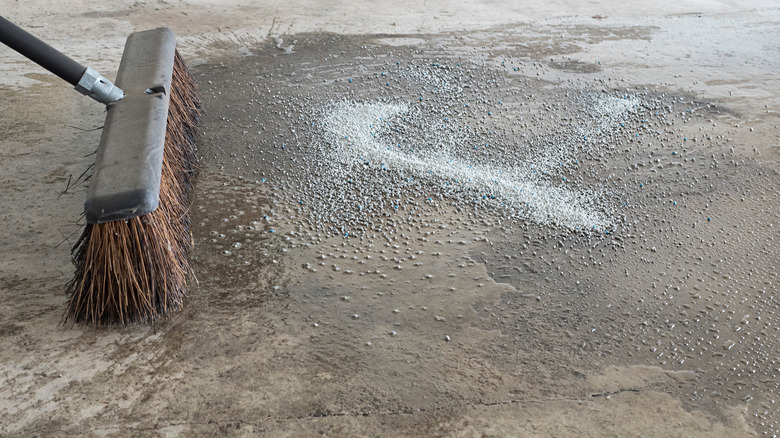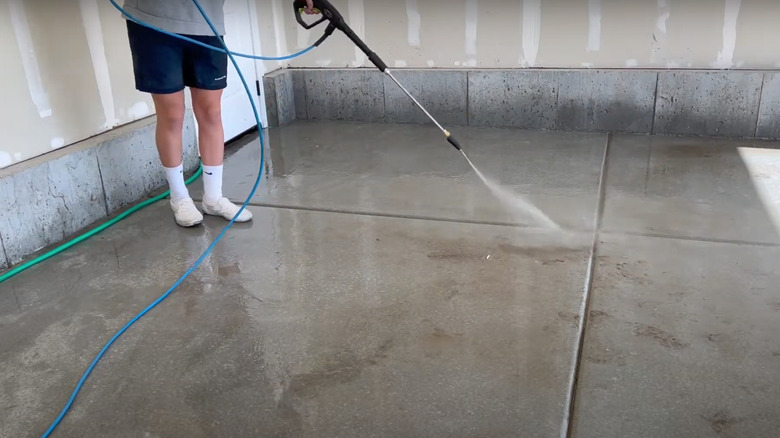The Kitty Litter Hack That'll Make Cleaning Up A Garage Spill So Easy
Whether you were topping off the oil in the lawn mower or spilled some greasy substance you're not too sure about on the cement, kitty litter could be the perfect solution for cleaning it up. Kitty litter is great because it is designed to absorb moisture, even from sticky materials like oil and grease. Oil stains on the driveway resulting from a leaky vehicle can be unsightly, hard to clean, and can worsen if it goes unnoticed for some time. They may seem to be permanent, but even older stains can come up or at least lighten with the help of litter.
Litter is a clay-based material. Most formulas today have various added ingredients to freshen up the scent or provide a clumping agent to make cleaning cat waste easy. You don't need anything fancy for the driveway, though. Rather, a generic product is perfect for this job. It's a good idea to stay away from products that have chemicals in them, especially those with synthetic crystallized silica. These are not ideal for the environment, and you don't want to deal with an additional mess to clean up. Also, the process of using kitty litter for oil spills is pretty simple to do.
How to use kitty litter to clean up a garage spill
Head to the store to purchase an inexpensive bag of kitty litter (you don't need a brand name, and you certainly want the most basic product). If you have products like no-clumping cat litter in your home, you can use that tool as long as it doesn't contain dyes or chemical additives unsafe for the groundwater supply. Then, pour it over the top of the stain, ensuring there is about 1 inch of litter on and around it. In some cases, that's all you need to do to get the process started.
More commonly, you'll want to encourage the litter to soak up the oil by applying pressure over it. Use your shoe to rub the litter into the oil stain. This will encourage it to soak up more of the material. If you don't want to get your favorite pair of shoes dirty, apply a brick or another heavy object over the top of the litter and move it back and forth, smashing the litter into the stain. Allow the litter to remain there for an hour or longer, depending on the size. Larger spills may take longer to absorb. You can leave it there overnight or even a day or two. The litter won't harm the cement in any way. Once you're ready, sweep up the litter and discard it. Use a hose to wash away the debris.
Alternatives for tougher garage spills
After using litter, if you don't see the results you want, it may be time to take a different approach to removing garage spills. You can use dirt from your garden for the same type of process. Sometimes this will do a better job of absorbing the spill, but make sure that you don't put it back into the garden afterward. You can also use baking soda and dry launder detergent in the same way you would use kitty litter to absorb the remaining material. WD-40 can also be helpful in removing oil from the driveway. Just spray the stain, scrub it down, and rinse it away.
If the stain is dry, old, and hasn't budged, it may be time to consider power washing the concrete to remove the stain. There are some concrete cleaning agents that could offer an extra layer of help to this process. Anything left after this isn't likely to be removed. If the surface no longer looks as spotless and clean as you like, consider painting the garage floor. While you could go with a basic gray color, you can also use a durable outdoor paint in another color or a mixture of colors to create something a bit more over the top.


